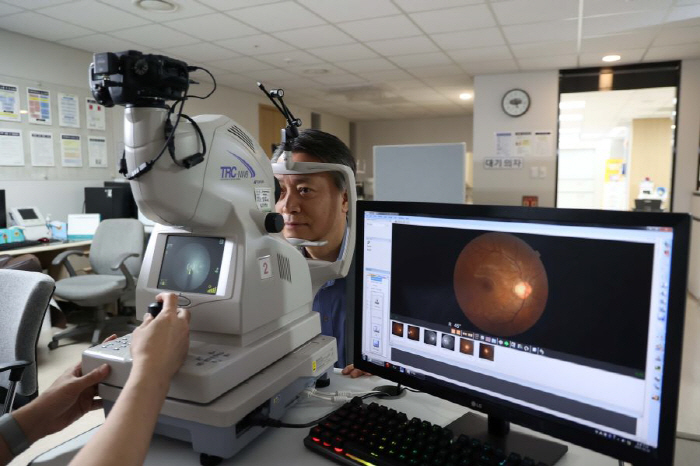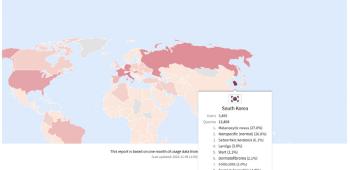Diabetic cataracts progress faster if blood sugar is not controlled
May 27, 2025
According to the Ministry of Health and Welfare's National Health and Nutrition Survey, the prevalence of diabetes in 2023 was 12% for men and 6.9% for women. If you have diabetes, various complications can also be accompanied, and if it affects the eyes, eye diseases such as diabetic retinopathy and diabetic cataracts can occur. Of these, diabetic cataracts require special attention because they progress faster than senile cataracts due to aging.
Cataracts are eye diseases in which the lens is cloudy and the vision is blurred or blurred. The most common cause is aging, but it can also appear as a complication of ophthalmic or systemic diseases such as diabetes, trauma, and uveitis. Diabetic cataracts, which can be a complication of diabetes, are caused by blood sugar rising, making blood sticky, and as sugar components gradually accumulate in the lens, the lens becomes cloudy.
Diabetic cataracts tend to progress very quickly and rapidly than senile cataracts, and due to rapid progression, the proper timing of surgery is sometimes missed. In addition, early diagnosis and appropriate treatment of the disease are very important because surgery can be difficult and good progress can be expected even after surgery.
The fundamental treatment for all cataracts, including diabetic cataracts, is surgery. However, in the case of diabetic cataract surgery, diabetes affects not only the lens, but also the entire eyeball such as the cornea, iris, and retina, and there is a relatively high probability of another complication. In addition, surgery with unstable blood sugar can slow recovery, damage retinal blood vessels, and cause other eye diseases such as vitreous bleeding or neovascular glaucoma. Therefore, it is necessary to improve your physical condition through thorough blood sugar management before undergoing surgery.
In addition, diabetic cataract patients are often accompanied by diabetic retinopathy, so retinal examination before cataract surgery is essential. Depending on the test results, retinal treatment is performed first before cataract surgery, and in some cases, retinal surgery and cataract surgery are performed at the same time. If diabetic cataracts and diabetic retinopathy are accompanied, cataract surgery effectiveness is likely to be lower than that of others. For successful surgery, it is important to check whether other eye diseases occur through thorough examinations such as fundus examination, light interferometry, and ultrasound examination before surgery and to determine treatment methods through consultation with a specialist.
"Diabetic cataracts are often more difficult to operate than general senile cataracts and need to be considered before and after surgery, so active cooperation from patients is also required," said Cho Han-joo, a specialist at Retinal Hospital in Kim Ophthalmology Hospital"It is important to consult an experienced specialist who is well aware of the characteristics of diabetic cataracts to determine the appropriate treatment method and undergo surgery."
Cataracts are eye diseases in which the lens is cloudy and the vision is blurred or blurred. The most common cause is aging, but it can also appear as a complication of ophthalmic or systemic diseases such as diabetes, trauma, and uveitis. Diabetic cataracts, which can be a complication of diabetes, are caused by blood sugar rising, making blood sticky, and as sugar components gradually accumulate in the lens, the lens becomes cloudy.
Diabetic cataracts tend to progress very quickly and rapidly than senile cataracts, and due to rapid progression, the proper timing of surgery is sometimes missed. In addition, early diagnosis and appropriate treatment of the disease are very important because surgery can be difficult and good progress can be expected even after surgery.
The fundamental treatment for all cataracts, including diabetic cataracts, is surgery. However, in the case of diabetic cataract surgery, diabetes affects not only the lens, but also the entire eyeball such as the cornea, iris, and retina, and there is a relatively high probability of another complication. In addition, surgery with unstable blood sugar can slow recovery, damage retinal blood vessels, and cause other eye diseases such as vitreous bleeding or neovascular glaucoma. Therefore, it is necessary to improve your physical condition through thorough blood sugar management before undergoing surgery.
In addition, diabetic cataract patients are often accompanied by diabetic retinopathy, so retinal examination before cataract surgery is essential. Depending on the test results, retinal treatment is performed first before cataract surgery, and in some cases, retinal surgery and cataract surgery are performed at the same time. If diabetic cataracts and diabetic retinopathy are accompanied, cataract surgery effectiveness is likely to be lower than that of others. For successful surgery, it is important to check whether other eye diseases occur through thorough examinations such as fundus examination, light interferometry, and ultrasound examination before surgery and to determine treatment methods through consultation with a specialist.
"Diabetic cataracts are often more difficult to operate than general senile cataracts and need to be considered before and after surgery, so active cooperation from patients is also required," said Cho Han-joo, a specialist at Retinal Hospital in Kim Ophthalmology Hospital"It is important to consult an experienced specialist who is well aware of the characteristics of diabetic cataracts to determine the appropriate treatment method and undergo surgery."
|
This article was translated by Naver AI translator.














